MANITOULIN—Most local fire departments and municipal leaders are in favour of the provincial government’s proposed regulation framework for mandatory minimum training standards for firefighters, but they do have some concerns. There may be additional costs to municipalities for one thing, but deeper concerns relate to firefighter retention and how to implement the standards within the legislated timelines.
On January 29, the Ontario government posted the regulatory framework for mandatory minimum training. The proposed firefighter certification model outlines the mandatory minimum standard and corresponding job performance requirements of firefighters delivering specific fire protection services.
“I am in support of the firefighter certification regulation in both of my roles, as the fire chief of the Township of Assiginack and the provincial mutual aid fire coordinator for the District of Manitoulin,” stated Dwayne Elliott. “There are still some questions being raised regarding the processes and there will be some confusion and growing pains as we sort through this certification process, but we are being reassured by the OFM (Ontario Fire Marshal) that they will be available to assist each fire department to achieve certification.”
The level of fire protection for a community will be set by the local municipality through an establishing and regulation bylaw, and training to that level is all that is required to meet certification, Mr. Elliott explained.
“This is going to be a large initiative, with more time required by the fire chief and training officers to facilitate this program,” he added. “It will require more training opportunities for each firefighter to achieve certification. There will be costs associated with agreements signed with the Ontario Fire College for learning plans as well as for purchasing access to NFPA (National Fire Protection Association) standards required to meet the training standards.”
“This will increase budgetary costs, but this can be expected and planned for in advance,” continued Mr. Elliott. “The benefit to these additional costs is that each fire department will be trained and certified to a standard recognized within the province as well as by the Ministry of Labour. This program will document a firefighter’s progress and level of training to meet our requirements through the Occupational Health and Safety Act to have members properly trained. This certification will greatly increase the safety of our firefighters and help reduce potential injuries or line of duty deaths.”
Ian Anderson, mayor of Billings Township, attended a virtual area certification meeting last week, hosted by the OFM and the Ontario Association of Fire Chiefs (OAFC) for fire chiefs and municipal leaders. “The province is enforcing that all firefighters are trained under a certain standard. It is good for the firefighters and for public safety. I can see no reason to disagree,” he said.
“It will get all municipalities looking at their bylaws to make sure there is adequate training and support for training,” Mayor Anderson added. “I see all of this as a positive and not negative at all. From my involvement, I see that by far the majority of all fire departments in Ontario have people trained to the standards that exist.”
“Our fire chief, Mike Addison, said our fire department can get there with a lot of discipline and a lot of work,” said Dan Osborne, mayor of the Town of Gore Bay, who doesn’t have quite the same rosy outlook. “They are saying there will be no cost to municipalities but there will be cost involved in training, for one. They’ll be spending more hours.”
Jason Whiteley, vice-president of OAFC and fire chief for the City of North Bay has been giving presentations about the new certification standard across the province. Certification is something that’s been talked about since the 1990s, he explained. Regulations were introduced under the Liberal government of Kathleen Wynne and scrapped by the Progressive Conservative government. This current draft regulation was open for public consultation until February 28.
Fire chiefs across Ontario have overwhelmingly agreed with the certification standards, said Mr. Whiteley, who also agreed, “there will be challenges implementing the standards, with costs and levels of service.”
Fire departments are already required to keep training plans, Mr. Whiteley said, so that requirement is not new. “The big concern is with testing and implementing the standards in small volunteer fire departments. One thing the regulation does is reinforce the responsibility of local councils to set the levels of service in their community and to support that.”
People have to understand there have been at least five coroner inquests in the province, beginning with a training death in Port Colborne in 1989, Mr. Whiteley said. These have shown where training was lacking and when it was needed. The new certification standards will ensure that all Ontario firefighters will be trained to properly provide the levels of service required by their communities.
Fire services have never had a province-wide standard, Mr. Whiteley pointed out. “The province has always been responsible for arranging testing and now they’re beefing up the OFM office. Everyone wants to achieve better fire safety. The biggest concerns we have been hearing are around how to implement the standards and what that’s going to cost. Every department will have different challenges. It all depends on how much fire departments have been training and where they’re at in the training process,” he said.
He is hoping the province will consider grant funding for this. “Last year they closed the fire college but provided a one-time grant to every fire department,” he said.
Ken Noland, reeve of Burpee and Mills Township said, “This appears to be almost the very same regulation as Liberal Kathleen Wynne tried to bring in several years ago, that the current premier quashed. Certainly, it is going to cost municipalities more money and it may be harder to recruit new firefighters.”
“If the province is going to legislate all this training, they need to set up and pay for the training and certification,” Reeve Noland added.
All of Billings Township’s experienced firefighters are currently certified, said Martin Connell, Billings Township fire chief. “There are six new trainees that will have to undergo the certification,” he said. “The legislation comes into effect this spring and we’ll have up to four years to certify our firefighters.”
“It will be a challenge in respect to those with experience being grandfathered for full certification,” he added. “Billings’ fire department is a fully certified department for auto extraction and inside and outdoor fires.”
He agrees it needs to be done, although it will be tough and will take more in-class time. “It’s fortunate some of our firefighters are retired but we have new recruits with families, where both parents work.”
Mr. Connell pointed out the OFM will provide testers to municipalities to facilitate examinations. Trailers will be visiting Manitoulin Island and all Manitoulin fire departments will have to work together for any one fire training service. Mutual aid will be used much more often in the future, he said. Having a full-time facility trailer on Manitoulin Island was discussed as a way to help local fire departments. If department members don’t have their certificate, the departments will have to utilize mutual aid more.
It requires a minimum of 10 firefighters at the scene of a residential fire. Recruits can be truck drivers, Mr. Connell noted, but if they’re not certified, they can’t fight fires. It will increase the demand on firefighter training budgets but he understands why the government is pushing this. “It is a workplace safety issue,” he said.
Town of Northeastern Manitoulin and the Islands (NEMI). Fire Chief Duane Deschamps agrees that a minimum certification program is needed. “They are offering some testers that would come and certify the firefighters once they’ve completed their training.,” he noted.
“There has been discussion among the fire chiefs of the Island that collaborating in bringing in a minimum level trainer should have us in good shape,” Mr. Deschamps said. “Firefighter retention might be difficult for some departments, but this could be an attraction for someone who wants to move on to become a full-time firefighter.”
Mr. Elliott added that, as the Manitoulin District Mutual Aid Fire Coordinator, “It is my intent to assist each department to grow with this process. It will require all Manitoulin fire departments to work cooperatively and share resources as needed to aid one another in their progression through the certification process. This will strengthen our interoperability with one another, adding to a more efficient mutual aid program.”
“There should be no need for a community to lose its fire department because of this regulation. If community members are willing to step up within their departments, the expectation is that they will attend regularly scheduled training sessions and work towards certification. Many departments have already adopted a minimum attendance requirement at practices and emergency responses to continue participation in their department,” Mr. Elliott said.
One concern that has been brought forward is the short timeline for certification for new recruits, which is set at two years. Mr. Elliott hopes that the OFM reviews their timelines before formally adopting this regulation. Currently, all fire departments beginning this certification will have a four year window to complete the program.
The regulation is proposed to come into force on July 1, 2022 with a four and six year compliance timeline, based on the level of fire protection service set out.





